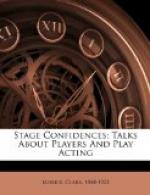Acting is a matter of pretence, and she who can best pretend a splendid passion, a tender love, or a murderous hate, is admittedly the finest actress. Time was when stage wardrobe was a pretence, too. An actress was expected to please the eye, she was expected to be historically correct as to the shape and style of her costume; but no one expected her queenly robes to be of silk velvet, her imperial ermine to be anything rarer than rabbit-skin. My own earliest ermine was humbler still, being constructed of the very democratic white canton flannel turned wrong side out, while the ermine’s characteristic little black tails were formed by short bits of round shoe-lacing. The only advantage I can honestly claim for this domestic ermine is its freedom from the moths, who dearly love imported garments of soft fine cloth and rare lining. I have had and have seen others have, in the old days, really gorgeous brocades made by cutting out great bunches of flowers from chintz and applying them to a cheaper background, and then picking out the high lights with embroidery silk, the effect being not only beautiful, but rich. All these make-believes were necessary then, on a $30 or $35 a week salary, for a leading lady drew no more.
[Illustration: Clara Morris as “Jane Eyre"]
But times are changed, stage lighting is better, stronger. The opera glass is almost universally used, deceptions would be more easily discovered; and more, oh, so much more is expected from the actress of to-day. Formerly she was required, first of all, to sink her own individuality in that of the woman she pretended to be; and next, if it was a dramatized novel she was acting in, she was to make herself look as nearly like the described heroine as possible; otherwise she had simply to make herself as pretty as she knew how in her own way, that was all. But now the actresses of a great city are supposed to set the fashion for the coming season. They almost literally dress in the style of to-morrow: thus the cult of clothes becomes harmful to the actress. Precious time that should be given to the minute study, the final polishing of a difficult character, is used instead in deciding the pitch of a skirt, the width of a collar, or open sleeve-strap, or no sleeve at all.
Some ladies of my acquaintance who had been to the theatre three times, avowedly to study as models the costumes, when questioned as to the play, looked at one another and then answered vaguely: “The performance? Oh, nothing remarkable! It was fair enough; but the dresses! They are really beyond anything in town, and must have cost a mint of money!”
So we have got around to the opposite of the old-time aim, when the answer might possibly have been: “The acting was beyond anything in town. The dresses? Nothing remarkable! Oh, well, fair enough!”




